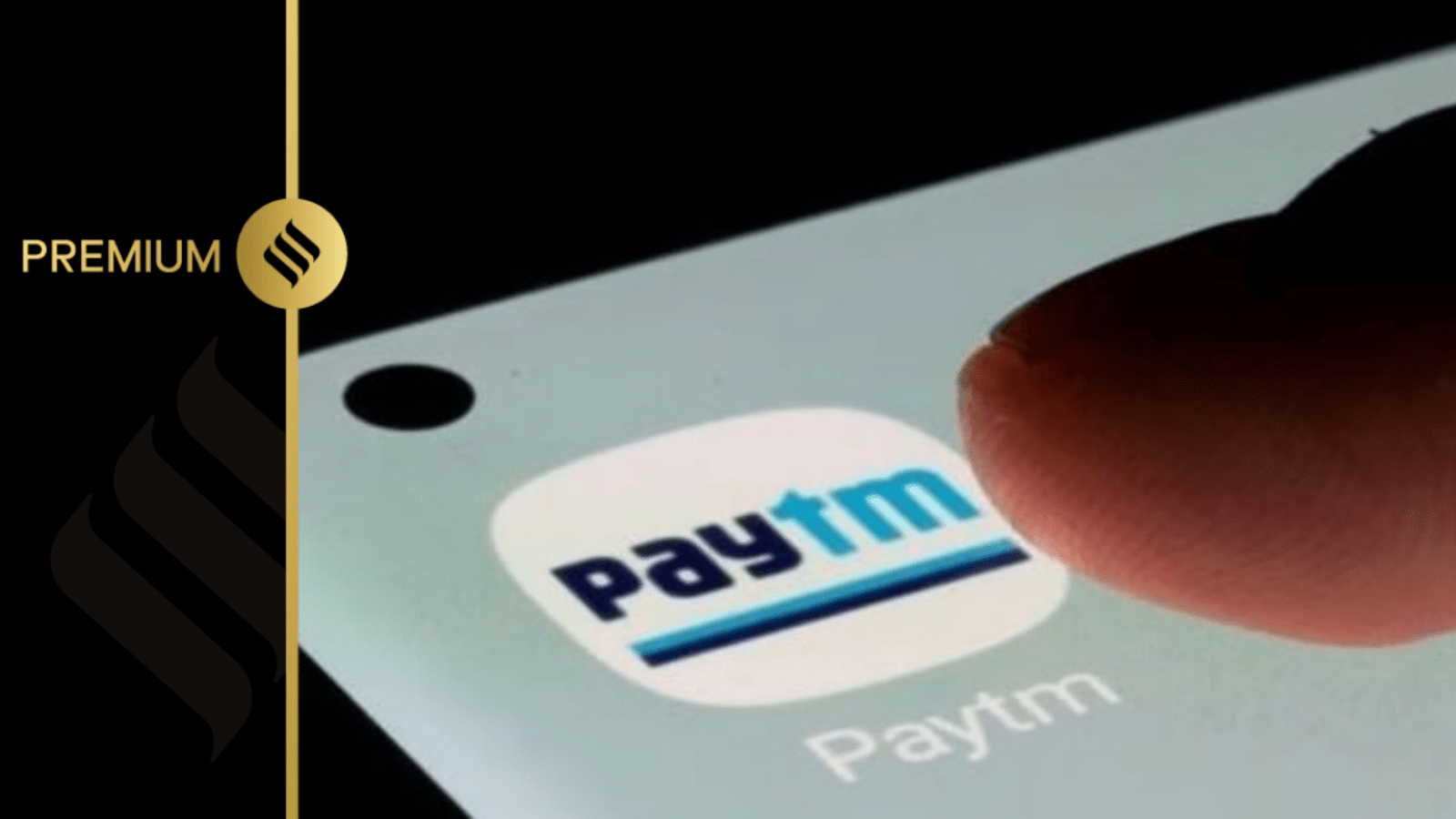So far, the song has tied in well into Sharma’s journey — from a small town in western Uttar Pradesh to helming India’s most valued fintech unicorn. Born to a school teacher in Aligarh, Sharma first built and sold an online venture for $1 million back in 1999 — when most Indians were still untouched by the Internet — before founding the fast-rising financial tech company Paytm in 2010.

Over a decade later, today, the company is deeply embedded in a number of digital infrastructure in India, ranging from FASTag to metro transit cards. One in three Indians who have access to the Internet currently uses the Paytm app. And though it ranks third in terms of UPI transaction volumes, after PhonePe and Google Pay, its payments bank is the largest beneficiary bank in the ecosystem, meaning that it has the biggest network of merchants who accept payments through its gateway.
But last month, the Reserve Bank of India (RBI) dealt a body blow to its associate payments bank, ordering it to stop accepting new deposits in its accounts beginning March, citing supervisory concerns and non-compliance with rules.
The payments bank is an associate of One97 Communications Limited, Paytm’s parent company. One97 Communications holds 49 per cent of the paid-up share capital of the payments bank while Sharma owns the remaining 51 per cent.
The RBI action all but stops operations of the payments bank, with the company anticipating an annualised impact of Rs 300-500 crore to its top line, a hit that’s likely to severely jeopardise its profitability path. The company’s scrip has also faced a rout at the bourses since then, having crashed more than 68 per cent in the last week.
With that, the big question for Sharma and his company is: where does Paytm go from here?
Story continues below this ad
Demonetisation, a rising star
Paytm became the flagbearer and poster child of India’s digital finance ecosystem in the aftermath of the demonetisation exercise in December 2016. It took out front page advertisements in all major newspapers the next day, thanking the Prime Minister and playing on its tagline to say, “Ab ATM nahin, #Paytm karo”.
Paytm (and Reliance Jio which ran similar ads) had to later apologise for the ads since they allegedly violated a law which bars the use of the Prime Minister’s name and photograph for commercial use.
But the job had been done and the classic move-fast-break-things methods employed by Paytm seemed to bear fruit. The company registered a 700 per cent increase in overall traffic and 1,000 per cent growth in the amount of money added to Paytm accounts a few days after demonetisation.
Just a little over a year before demonetisation, China’s Alibaba and Ant Group had together made a ‘strategic’ investment of $680 million in Paytm in September 2015, making them the largest shareholders of One97 Communications at the time. At one point in 2015, the Alibaba Group held close to a 40 per cent stake in Paytm.
Story continues below this ad
Sharma’s star was on the rise. Flush with capital, he started an ambitious expansion of the company, venturing into segments such as e-commerce. Demonetisation was a big bump for the company. Then came UPI — and with it, the signal that the Indian government was going to prioritise such payments through key policy interventions like the zero merchant discount rate (MDR, the fee charged to merchants for accepting digital payments).

A senior bureaucrat who has played a pivotal role in building India’s digital public infrastructure told this paper that when he was leading a key regulator some years ago, there was a meeting to discuss interoperability of payments wallets — the kind that Paytm has pioneered. But the regulator felt that Sharma, who was at the meeting, was completely against the idea. At the time, the plan could not be materialised, but the RBI mandated wallet interoperability several years later, in March 2023. Following this, Paytm had to relent and allow wallet interoperability with UPI.
Then came 2020, and with it, skirmishes at the northern border. China became a bad word in India, TikTok was banned, and New Delhi revised its foreign direct investments rules, with funds coming in from “neighbouring countries” requiring a nod from the government. Given the significant ownership of Chinese investors in the company, Paytm too felt the heat.
As Paytm was headed towards a public offering the next year, the company needed to pare down Chinese investments. Following Paytm’s 2021 IPO, Alibaba has now completely exited Paytm — the company sold its remaining stakes in Paytm for $167 million last February.
Story continues below this ad
But somehow, the Chinese money, which was crucial in fueling Paytm’s growth journey, also became its nadir. In 2022, as Alibaba exited Paytm Mall, Sharma’s e-commerce venture, its valuation fell from $3 billion to $13 million.
Crackdown, an uncertain path
While the RBI has not spelt out the reasons behind its latest action in great detail, sources have said that Paytm Payments Bank and its parent One97 Communications came under scrutiny for purported lack of requisite information barriers within the group, and for allegedly allowing data access to China-based entities that were indirect shareholders in the payments bank through their stake in the parent company.
The UPI soundbox — the speaker that retailers use for instant audio payment confirmation — was a major innovation that Paytm brought to the market in 2019. It sold the device to its merchants for a monthly subscription of Rs 99. The device was appreciated by merchants, but it also allowed Paytm to add a revenue stream to UPI payments, which are otherwise free for users and merchants.
However, in the days following the RBI’s crackdown on the group’s payments bank, a number of merchants across Delhi NCR had taken the soundbox out of display, fearing the future of their money with the company since a number of them are customers of the payments bank.
Yet, Sharma continues to command respect in the Indian start-up community given the sheer size of the business he managed to build despite his humble origins. He is also a prolific angel investor known to have invested in upcoming start-ups.
Story continues below this ad
After the RBI’s action, a dozen prominent start-up founders, including Deepak Shenoy of CapitalMind and Murugavel Janakiraman of Bharat Matrimony, wrote to the RBI asking it to reconsider its decision.
Yet, others who know Sharma say his “growth at all costs mentality”, which helped Paytm become a behemoth in the payments space, was bound to backfire. People who have worked with him in the past claim that decision-making at the company is centred around Sharma, with very little space for constructive criticism.
A senior executive at an investment firm, which holds a minority stake in Paytm, told The Indian Express that the VC firm sees three major chinks in its India portfolio. “Of these, Paytm is the most complex one because Sharma can be unpredictable,” the executive said, requesting anonymity.
Government officials who have interacted with Sharma also paint the picture of a man who seemed to command considerable clout.
“He is a one-man army. If he believes something is right, it is very difficult for those around him to change his mind,” a person who has previously worked at Paytm said, requesting anonymity.
Story continues below this ad
Though Paytm and its payments bank are two separate, even if “associate”, entities, Sharma’s influence over the decision making process is immense.
Since the RBI order, Paytm got the analysts on a videoconferencing call, and even there, the conversation, say those who were part of it, was led by the leadership of Paytm — Sharma and CFO Madhur Deora — not anyone from the board of the payments bank.
This, despite the Paytm Payments Bank boasting of an “illustrious board coming from a diverse background”, according to its website.
While Sharma is the part-time chairman of the Paytm Payments Bank Ltd, the other members on the board include A K Jain, former Executive Director (ED) of Punjab and Sind Bank; Manju Agarwal, former Deputy MD of SBI; and Srinivas Yanamandra, former compliance official with the New Development Bank and ICICI Bank. Pankaj Vaish, former MD of Accenture India, and Ramesh Abhishek, former bureaucrat, are also on the board. The bank’s MD and CEO is Surinder Chawla.
Experts have questioned the role of the board, which, despite being aware of the red flags raised by the RBI, is said to have turned a blind eye to dealings between Paytm and the payments bank and KYC compliance issues, among other things.
Story continues below this ad
“What were they (board members) doing in the board meeting? Why were they not asking relevant questions when the RBI’s inspection report was brought to their attention? They didn’t bother to check and control the default,” said an expert who specialises in corporate governance practices.
In response to a detailed questionnaire, a Paytm spokesperson said, “We believe this query is pertaining to Paytm Payments Bank which is a separate entity. You may please coordinate with them directly for information”. However, so far, all communications related to the payments bank were being handled by the same communications team.
The Indian Express reached out to the bank’s two independent directors – Jain and Agarwal – and its MD & CEO Chawla, to seek comments, but did not receive a response.
Other fintechs feel the heat
For now, the Paytm saga has made other founders in the fintech space anxious. As start-ups already deal with a funding winter owing to global headwinds and geopolitical tensions across the globe, they see the RBI’s action as a signal that start-ups may no longer enjoy the leeway they once did.
Story continues below this ad
“The Paytm issue reduces public trust in fintech companies. Investors and users may think that if a big entity like Paytm can fall prey to missteps, what is stopping smaller firms from not repeating the same pattern,” a fintech founder said.
“The irony is that India embraced and celebrated Paytm when it had big Chinese money. And blew a death blow to it when it had ostensibly become a lot more Indian,” a second fintech executive said.
Other experts said the Paytm Payments Bank crisis will have an impact on the valuation of all fintech players.
“Just as holding companies see HoldCo discounts in their valuations, we are going to see fintech discounts for some time. Thanks to Paytm, the trust issues around fintech will need more confidence building by the fintechs. They have now become collateral damage to non-compliance of a large fintech player,” said Srinath Sridharan, author, policy researcher and corporate advisor.
Sharma, meanwhile, will have to take a new approach with the company, and steer Paytm in a new direction, probably where the streets have no name.










